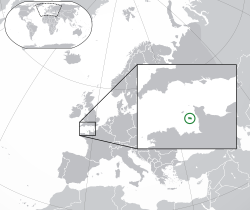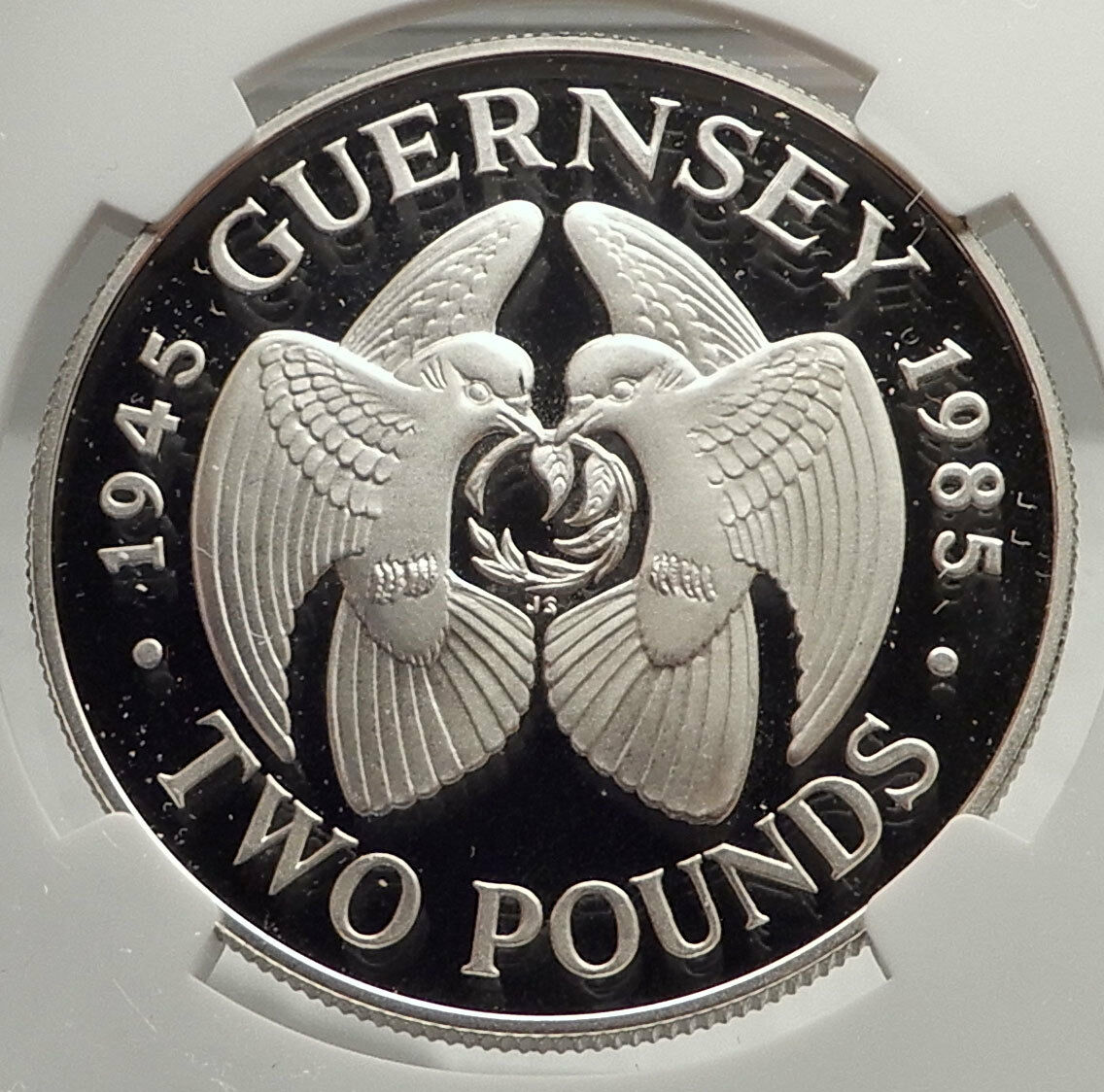|
Jersey under George V – King of Britain: 6 May 1910 – 20 January 1936
1926 1/12th Shilling 30mm (9.57 grams)
Reference: KM# 14 (1923, 26*)
GEORGIVS V D.G.BRITT: OMN:REX F.D.IND:IMP:, Crowned bust of King George V left.
STATES·OF·JERSEY 19 ONE·TWELFTH·OF·A·SHILLING, Shield with three lions.
You are bidding on the exact item pictured, provided with a Certificate of Authenticity and Lifetime Guarantee of Authenticity.
 George V (George Frederick Ernest Albert; 3 June 1865 – 20 January 1936) was King of the United Kingdom and the British Dominions, and Emperor of India, from 6 May 1910 until his death in 1936. George V (George Frederick Ernest Albert; 3 June 1865 – 20 January 1936) was King of the United Kingdom and the British Dominions, and Emperor of India, from 6 May 1910 until his death in 1936.
He was the second son of Albert Edward, Prince of Wales (later King Edward VII), and the grandson of the reigning British monarch, Queen Victoria. From the time of his birth, he was third in the line of succession behind his father and his elder brother, Prince Albert Victor, Duke of Clarence and Avondale. From 1877 to 1891, George served in the Royal Navy, until the unexpected death of his elder brother in early 1892 put him directly in line for the throne. On the death of his grandmother in 1901, George’s father became King-Emperor of the British Empire, and George was created Prince of Wales. He succeeded his father in 1910. He was the only Emperor of India to be present at his own Delhi Durbar.
His reign saw the rise of socialism, communism, fascism, Irish republicanism, and the Indian independence movement, all of which radically changed the political landscape. The Parliament Act 1911 established the supremacy of the elected British House of Commons over the unelected House of Lords. As a result of the First World War (1914-18) the empires of his first cousins Tsar Nicholas II of Russia and Kaiser Wilhelm II of Germany fell while the British Empire expanded to its greatest effective extent. In 1917, George became the first monarch of the House of Windsor, which he renamed from the House of Saxe-Coburg and Gotha as a result of anti-German public sentiment. In 1924 he appointed the first Labour ministry and in 1931 the Statute of Westminster recognised the dominions of the Empire as separate, independent states within the Commonwealth of Nations. He was plagued by illness throughout much of his later reign and at his death was succeeded by his eldest son, Edward VIII.
 Jersey (/ˈdʒɜːrzi/, French: [ʒɛʁzɛ]; Jèrriais: Jèrri IPA: [dʒɛri]), officially the Bailiwick of Jersey (French: Bailliage de Jersey; Jèrriais: Bailliage dé Jèrri), is a Crown dependency located near the coast of Normandy, France. Jersey was part of the Duchy of Normandy, whose dukes went on to become kings of England from 1066. After Normandy was lost by the kings of England in the 13th century, and the ducal title surrendered to France, Jersey and the other Channel Islands remained attached to the English crown. Jersey (/ˈdʒɜːrzi/, French: [ʒɛʁzɛ]; Jèrriais: Jèrri IPA: [dʒɛri]), officially the Bailiwick of Jersey (French: Bailliage de Jersey; Jèrriais: Bailliage dé Jèrri), is a Crown dependency located near the coast of Normandy, France. Jersey was part of the Duchy of Normandy, whose dukes went on to become kings of England from 1066. After Normandy was lost by the kings of England in the 13th century, and the ducal title surrendered to France, Jersey and the other Channel Islands remained attached to the English crown.
 The bailiwick consists of the island of Jersey, the largest of the Channel Islands, along with surrounding uninhabited islands and rocks collectively named Les Dirouilles, Les Écréhous, Les Minquiers, Les Pierres de Lecq, and other reefs. Although the bailiwicks of Jersey and Guernsey are often referred to collectively as the Channel Islands, the “Channel Islands” are not a constitutional or political unit. Jersey has a separate relationship to the Crown from the other Crown dependencies of Guernsey and the Isle of Man, although all are held by the monarch of the United Kingdom. The bailiwick consists of the island of Jersey, the largest of the Channel Islands, along with surrounding uninhabited islands and rocks collectively named Les Dirouilles, Les Écréhous, Les Minquiers, Les Pierres de Lecq, and other reefs. Although the bailiwicks of Jersey and Guernsey are often referred to collectively as the Channel Islands, the “Channel Islands” are not a constitutional or political unit. Jersey has a separate relationship to the Crown from the other Crown dependencies of Guernsey and the Isle of Man, although all are held by the monarch of the United Kingdom.
 Jersey is a self-governing parliamentary democracy under a constitutional monarchy, with its own financial, legal and judicial systems, and the power of self-determination. The Lieutenant Governor on the island is the personal representative of the Queen. It is the second closest of the Channel Islands to France, after Alderney. Jersey is a self-governing parliamentary democracy under a constitutional monarchy, with its own financial, legal and judicial systems, and the power of self-determination. The Lieutenant Governor on the island is the personal representative of the Queen. It is the second closest of the Channel Islands to France, after Alderney.
Jersey is not part of the United Kingdom, and has an international identity separate from that of the UK, but the UK is constitutionally responsible for the defence of Jersey. The definition of United Kingdom in the British Nationality Act 1981 is interpreted as including the UK and the Islands together. The European Commission have confirmed in a written reply to the European Parliament in 2003 that Jersey is within the Union as a European Territory for whose external relationships the UK is responsible. Jersey is not fully part of the European Union but has a special relationship with it, notably being treated as within the European Community for the purposes of free trade in goods.
British cultural influence on the island is evident in its use of English as the main language and the British pound as its primary currency, even if some people still speak the Norman language. Additional cultural commonalities include driving on the left, access to the BBC and ITV regions, a school curriculum following that of England, and the popularity of British sports, including cricket.
|




 George V (George Frederick Ernest Albert; 3 June 1865 – 20 January 1936) was King of the United Kingdom and the British Dominions, and Emperor of India, from 6 May 1910 until his death in 1936.
George V (George Frederick Ernest Albert; 3 June 1865 – 20 January 1936) was King of the United Kingdom and the British Dominions, and Emperor of India, from 6 May 1910 until his death in 1936. Jersey (/ˈdʒɜːrzi/, French: [ʒɛʁzɛ]; Jèrriais: Jèrri IPA: [dʒɛri]), officially the Bailiwick of Jersey (French: Bailliage de Jersey; Jèrriais: Bailliage dé Jèrri), is a Crown dependency located near the coast of Normandy, France. Jersey was part of the Duchy of Normandy, whose dukes went on to become kings of England from 1066. After Normandy was lost by the kings of England in the 13th century, and the ducal title surrendered to France, Jersey and the other Channel Islands remained attached to the English crown.
Jersey (/ˈdʒɜːrzi/, French: [ʒɛʁzɛ]; Jèrriais: Jèrri IPA: [dʒɛri]), officially the Bailiwick of Jersey (French: Bailliage de Jersey; Jèrriais: Bailliage dé Jèrri), is a Crown dependency located near the coast of Normandy, France. Jersey was part of the Duchy of Normandy, whose dukes went on to become kings of England from 1066. After Normandy was lost by the kings of England in the 13th century, and the ducal title surrendered to France, Jersey and the other Channel Islands remained attached to the English crown.  The bailiwick consists of the island of Jersey, the largest of the Channel Islands, along with surrounding uninhabited islands and rocks collectively named Les Dirouilles, Les Écréhous, Les Minquiers, Les Pierres de Lecq, and other reefs. Although the bailiwicks of Jersey and Guernsey are often referred to collectively as the Channel Islands, the “Channel Islands” are not a constitutional or political unit. Jersey has a separate relationship to the Crown from the other Crown dependencies of Guernsey and the Isle of Man, although all are held by the monarch of the United Kingdom.
The bailiwick consists of the island of Jersey, the largest of the Channel Islands, along with surrounding uninhabited islands and rocks collectively named Les Dirouilles, Les Écréhous, Les Minquiers, Les Pierres de Lecq, and other reefs. Although the bailiwicks of Jersey and Guernsey are often referred to collectively as the Channel Islands, the “Channel Islands” are not a constitutional or political unit. Jersey has a separate relationship to the Crown from the other Crown dependencies of Guernsey and the Isle of Man, although all are held by the monarch of the United Kingdom.  Jersey is a self-governing parliamentary democracy under a constitutional monarchy, with its own financial, legal and judicial systems, and the power of self-determination. The Lieutenant Governor on the island is the personal representative of the Queen. It is the second closest of the Channel Islands to France, after Alderney.
Jersey is a self-governing parliamentary democracy under a constitutional monarchy, with its own financial, legal and judicial systems, and the power of self-determination. The Lieutenant Governor on the island is the personal representative of the Queen. It is the second closest of the Channel Islands to France, after Alderney. 




